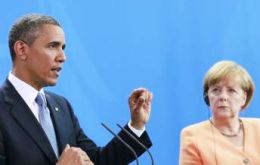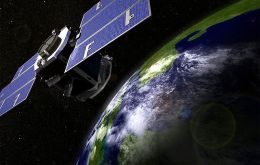MercoPress. South Atlantic News Agency
Tag: US cyber-spying
-
Tuesday, November 15th 2016 - 09:55 UTC
Conference in Buenos Aires: Snowden fears domestic intelligence will spread in US under Trump

Former US spy agency contractor Edward Snowden said on Monday, that Donald Trump's election may increase the intrusiveness of domestic intelligence gathering and warned that the democratic checks and balances were losing ground to authoritarianism.
-
Wednesday, July 1st 2015 - 05:52 UTC
Obama and Rousseff agree their nations are 'natural partners' and working on an 'upward trajectory'

President Barack Obama and visiting Brazilian President Dilma Rousseff sought Tuesday to cast their nations as “natural partners” collaborating closely on critical issues like climate and regional diplomacy, glossing over recent tensions over spying that have strained relations between the first and seventh world economies.
-
Tuesday, November 18th 2014 - 06:02 UTC
Rousseff wants to improve ties with Washington, but hurdles and attitudes persist

Brazilian President Dilma Rousseff, who cancelled a White House trip last year in anger over U.S. spying revelations, now wants to improve ties and reschedule the state visit - but some U.S. officials warn it might not be that easy.
-
Thursday, March 27th 2014 - 08:07 UTC
Brazil lower house approves internet legislation to ensure privacy and neutrality

The lower house of Brazil’s Congress has approved legislation meant to ensure the privacy of Internet users and to guarantee what is called “Internet neutrality”, that all content be treated equally by carriers. But it dropped a demand that all data on Brazilians be saved within the country.
-
Saturday, January 18th 2014 - 06:21 UTC
Obama announces contention policy for NSA monitoring activities

President Barack Obama has announced a ban on US eavesdropping on the leaders of close friends and allies, and rein in the vast collection of Americans' phone data in a series of reforms triggered by Edward Snowden's revelations.
-
Friday, December 20th 2013 - 06:54 UTC
Brazil and Germany, with UN support hit back at US cyber spying

UN General Assembly has adopted a resolution aimed at protecting the right to privacy of internet users. The resolution was introduced by Brazil and Germany after allegations that the US had been eavesdropping on foreign leaders, including Brazil's Dilma Rousseff and Germany's Angela Merkel.
-
Tuesday, December 17th 2013 - 02:18 UTC
US insists Obama remains open to a state visit from Brazil's Dilma Rousseff

The new US ambassador in Brazil Liliana Ayalde said President Barack Obama is prepared to receive his Brazilian peer Dilma Rousseff. The statement comes weeks after a state visit planned for last October was suspended by Dilma in protest over revelations of extensive US spying of Brazilian communications including the mobiles of the Brazilian leader.
-
Friday, November 29th 2013 - 23:30 UTC
Brazil will have its own national-made secure communications satellite by 2016

Brazil's state-owned telecom provider Telebras signed a 560m dollar contract to deliver a satellite for secure communications on Thursday, following months of outrage over revelations of US cyber spying. A statement said a joint venture between Telebras and Embraer would deliver the geostationary satellite for strategic communications by late 2016.
-
Friday, November 22nd 2013 - 20:34 UTC
Argentina and Brazil coordinating cyber-defense in the framework of Unasur

Argentine Defense Minister Agustín Rossi met his Brazilian counterpart, Celso Amorim and agreed to incorporate all South American countries in their bilateral treaty on cyber-defense. The decision was made after several reports indicated the United States engaged in espionage activities against the countries in the region.
-
Tuesday, October 29th 2013 - 16:37 UTC
Spying on your neighbor: Rousseff demands from congress urgent legislation

The US National Security Agency’s cyber spying on foreign heads of state from Angela Merkel to Dilma Rousseff is poised to produce its first high-profile corporate casualty: Google Inc.’s operations in Brazil.
